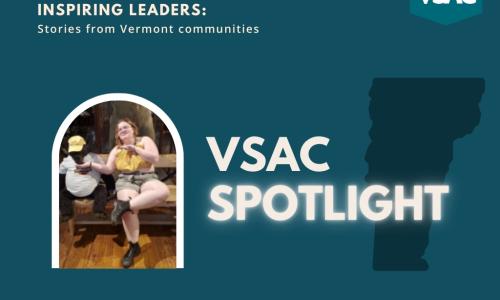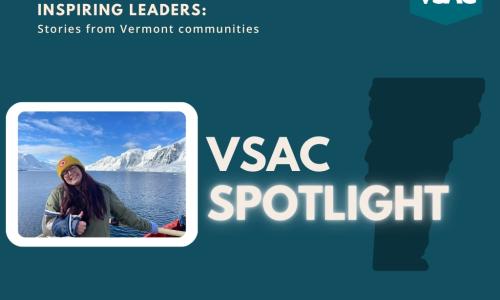Planning for college or training this year? Apply for the Vermont Grant.
Sarah Kourkoulis of St. Johnsbury uses forgivable loan program to accelerate her teaching career

Sarah Kourkoulis’ motto is “You’re younger than you think you are.”
The 47-year-old St. Johnsbury native, who is currently working toward her bachelor’s degree from the Johnson campus of Vermont State University (VTSU-Johnson), says her parents set that example for her. Her father Bobby, who ran a restaurant in St. Johnsbury for many years, emigrated from Greece in 1973. “I always thought he was so brave to leave his country at 23 years old and move somewhere where he didn’t even know the language,” says Sarah.
After her dad died in 2022, Sarah’s mom, Linda, who was born and raised in Essex Junction, followed his example in reverse. “She now goes back and forth between North Carolina and Greece, and she’s the one learning a new language at 74.”
“The fact that my parents started these new adventures has been an important part of my motivation,” says Sarah. “There’s so much more life to live and so many opportunities. You just have to be brave enough to take that first step.”
Continuing adult education
Sarah kept that foremost in mind when she decided, in her mid-forties, that it was time to pursue a college degree. That said, starting the journey at midlife made the finances a bit more challenging. “At this point in my life, I wasn’t looking to take out any more loans,” Sarah says. So the Vermont Teacher Forgivable Loan Program, managed by VSAC, came at a very opportune time.
“It paid for an entire year of school, plus some of the extra bills that went with it. Not only did that program make it possible for me to go back to school, but it’ll allow me to graduate with very little in loans,” she says.
When everyone was talking about Vermont needing more teachers, this program felt like a tangible way to keep us here. Being a teacher sometimes feels hard, but this was one part that felt really helpful and supportive.
While she never got the formal training, Sarah has been teaching high school students almost since she finished up her own secondary education at St. Johnsbury Academy. “I always loved school, and when I started helping home-school my younger brother, who was 17 at the time, I found out I really liked teaching.” A family friend then asked if Sarah could teach their daughter Algebra I, and things progressed from there. “I loved getting to know the kids, building relationships with them, and taking a topic they were completely confused by and turning it around so they could see it differently."
From home-school to in-school
Sarah has worked with 20 home-schooled students over the last two decades. “My goal was to prepare them for life after school, to invite them to look at the world differently and appreciate it,” says Sarah, who created her own curriculum. “I wanted to teach some perspectives that might not be in the textbooks.”
By the time Sarah reached her early 40s, she was substitute-teaching at People’s Academy in Morrisville and she loved being part of a larger school-based community. But when her colleagues encouraged her to apply for an open position, she realized that, without a bachelor’s degree, she couldn’t get the job. “I had a lot of experience, but it wasn’t good enough,” says Sarah.
I was also very aware of my own limitations. Yes, I can teach, and there are a lot of parts of teaching I know I’m good at. But there were also so many tools I lacked.
She began her college journey at the Community College of Vermont, where counselor Billi Dunham encouraged her to reach out to Ran Wang at VSAC. “I didn’t have the finances, and working with VSAC made it possible,” Sarah says.
Earning credits through assessment
At CCV, Sarah took the Assessment of Prior Learning course, in which adult students are asked to document their life experience in their field of study by writing essays and gathering letters of recommendation. “This was the hardest class I’ve ever taken,” Sarah recalls. “It was psychologically intense, going through your entire life and pulling out all of your learning. It was also therapeutic. I had some serious imposter syndrome,” she says, and putting all her experience down on paper, and asking others for help attesting to it, helped her realize how qualified she was. It also gave her a leg up; she earned 45 credits, including 11 courses of history.
History is one of Sarah’s favorite subjects to teach, especially to high school students who are just beginning to learn critical thinking skills.
I love to equip kids for the future, whatever that looks like for them, whether that’s college or a trade. But for every kid, it means understanding and appreciating history and asking, ‘How can we learn from this?’
Sarah would also like to create a financial literacy course for high school students. “Too many kids are getting in trouble with spending and borrowing and not understanding interest rates. Going into debt is not a great way to start out your life.”
Now in her junior year at VTSU-Johnson, Sarah is looking forward to practicums this fall and beginning her student teaching next spring. “It’s really been a gift,” says Sarah, who is grateful for the support she’s received from many places: family and friends, her employer—House of Troy lamp company in Hyde Park, where she works full-time alongside her courseload—to her counselors at CCV, VTSU, and VSAC.
“I had parents, family, and friends that were all super supportive of me. But for those who don’t have that, there is such a supportive community out there,” says Sarah. “No matter what, you will find plenty of people who believe in you.”






